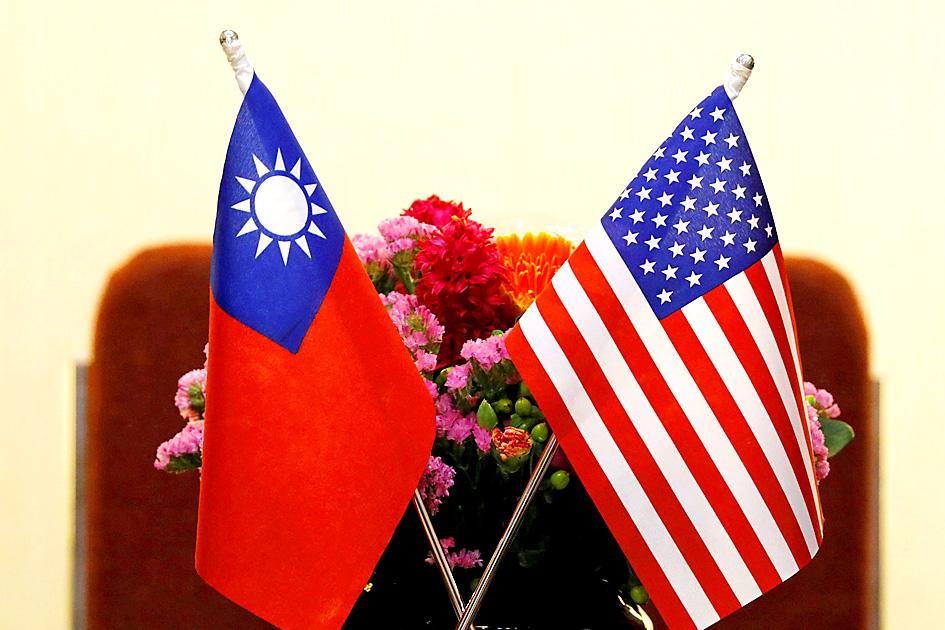The American Chamber of Commerce in Taiwan (AmCham) yesterday proposed a Taiwan commercial initiative (TCI) that would elevate Taiwan-US economic ties to a new level, and possibly lead to a bilateral trade agreement (BTA).
The chamber unveiled the plan during a virtual news conference scheduled for the release of its annual position paper, which calls for the initiative and a stable electricity supply, among other demands.
The trade group, which has 1,000 members from more than 500 foreign firms, said that the position paper outlines for Washington a six-track strategic approach to the enhancement of Taiwan-US economic and business relations.

Photo: Tyrone Siu, Reuters
“The stars are aligning for a sharp upgrade in US-Taiwan economic relations... AmCham is calling for more platforms and more private sector involvement through the TCI,” chamber president Andrew Wylegala said.
The first track has been achieved, following an announcement by the two sides that Trade and Investment Framework Agreement council meetings are to resume, the chamber said, adding that it had vigorously pushed for the talks to resume since their suspension four years ago.
The TCI calls for an expansion of the Taiwan-US Economic Prosperity Partnership Dialogue initiated by the US Department of State in November last year by encompassing business participation, it said.
The TCI urges the Ministry of Economic Affairs and the US Department of Commerce to build transaction-oriented platforms promoting two-way trade and investment, include Taiwan in a multilateral economic agreement and establish a Taiwan-US pact on double taxation, it added.
The work streams reinforce each other and pave the way to the ultimate goal: a US-Taiwan trade agreement, it said.
The next few years might witness the biggest and most positive transformation in Taiwan’s economic links with the world since the Taiwan Relations Act in the 1970s and its entry into the WTO in the 2000’s, chamber chairman C.W. Chin (金奇偉) said, adding that the chamber is eager to make its contribution.
The position paper underscores pressing concerns, such as accelerating Taiwan’s digital transformation, bolstering its supply chains and ensuring a stable supply of energy as Taiwan seeks to transform its energy mix by 2025.
The paper advocates for the creation of a sovereign wealth fund that would draw on Taiwan’s large foreign reserves and increase its international profile.
AmCham called on the US government to allocate more surplus vaccines to Taiwan and to facilitate delivery from other sources, saying that Taiwan deserves to secure a steady supply of vaccine doses to protect its population in the wake of the recent local virus outbreak.
To transform Taiwan into an international destination, the chamber said that English classes in Taiwanese schools should focus on comprehension and oral communication, not on spelling and grammar, as has long been the local education model.
Taiwan should be more open to English-language multimedia content and incorporate online learning at all levels of its education system, as the nation would never be able to hire enough English teachers for all Taiwanese children, it said.

Among the rows of vibrators, rubber torsos and leather harnesses at a Chinese sex toys exhibition in Shanghai this weekend, the beginnings of an artificial intelligence (AI)-driven shift in the industry quietly pulsed. China manufactures about 70 percent of the world’s sex toys, most of it the “hardware” on display at the fair — whether that be technicolor tentacled dildos or hyper-realistic personalized silicone dolls. Yet smart toys have been rising in popularity for some time. Many major European and US brands already offer tech-enhanced products that can enable long-distance love, monitor well-being and even bring people one step closer to

Malaysia’s leader yesterday announced plans to build a massive semiconductor design park, aiming to boost the Southeast Asian nation’s role in the global chip industry. A prominent player in the semiconductor industry for decades, Malaysia accounts for an estimated 13 percent of global back-end manufacturing, according to German tech giant Bosch. Now it wants to go beyond production and emerge as a chip design powerhouse too, Malaysian Prime Minister Anwar Ibrahim said. “I am pleased to announce the largest IC (integrated circuit) Design Park in Southeast Asia, that will house world-class anchor tenants and collaborate with global companies such as Arm [Holdings PLC],”

TRANSFORMATION: Taiwan is now home to the largest Google hardware research and development center outside of the US, thanks to the nation’s economic policies President Tsai Ing-wen (蔡英文) yesterday attended an event marking the opening of Google’s second hardware research and development (R&D) office in Taiwan, which was held at New Taipei City’s Banciao District (板橋). This signals Taiwan’s transformation into the world’s largest Google hardware research and development center outside of the US, validating the nation’s economic policy in the past eight years, she said. The “five plus two” innovative industries policy, “six core strategic industries” initiative and infrastructure projects have grown the national industry and established resilient supply chains that withstood the COVID-19 pandemic, Tsai said. Taiwan has improved investment conditions of the domestic economy

Sales in the retail, and food and beverage sectors last month continued to rise, increasing 0.7 percent and 13.6 percent respectively from a year earlier, setting record highs for the month of March, the Ministry of Economic Affairs said yesterday. Sales in the wholesale sector also grew last month by 4.6 annually, mainly due to the business opportunities for emerging applications related to artificial intelligence (AI) and high-performance computing technologies, the ministry said in a report. The ministry forecast that retail, and food and beverage sales this month would retain their growth momentum as the former would benefit from Tomb Sweeping Day